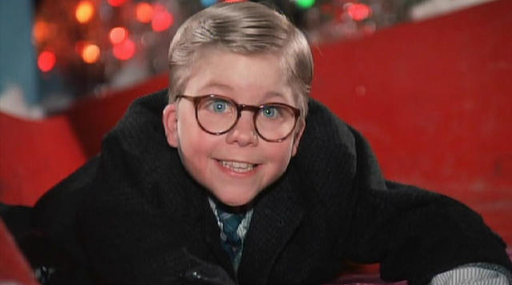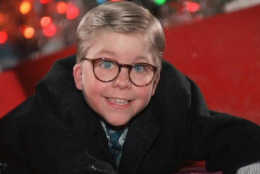
The song "Frosty the Snowman" was first recorded by Gene Autry in 1950, but the version that plays in our heads is Jimmy Durante's rendition from this 1969 animated classic by Jules Bass and Arthur Rankin Jr. ("Santa Claus is Comin' to Town").
Durante narrates as a group of school kids witness Professor Hinkle's magic hat bring Frosty to life one day. Karen leads Frosty to a colder climate to prevent him from melting, but Hinkle is right on their heels trying to steal back his hat.
When Frosty turns "wishy washy" in a greenhouse full of poinsettias, it's up to Santa to save the day.
Few comic actors can go from streaking in "Old School" (2003) to donning a green suit and pointy elf shoes in the same year. But that's exactly what Will Ferrell did in "Elf," Jon Favreau's "fish out of water" story about an adult-sized elf who literally doesn't "fit in" at the North Pole and tries his luck in New York City.
Ferrell's wide-eyed innocence is hysterical, backed by Ed Asner ("Mary Tyler Moore"), Bob Newhart ("The Bob Newhart Show"), James Caan ("The Godfather") and Zooey Deschanel ("500 Days of Summer").
Who better to make a children's Christmas classic than director Chris Columbus ("Harry Potter") and writer John Hughes ("The Breakfast Club")?
Macaulay Culkin became a cheek-slapping child star as the forgotten son of Catherine O'Hara and John Heard; John Candy propelled a subplot straight from "Planes, Train and Automobiles" (1987) and Joe Pesci and Daniel Stern took pratfalls through a trap-filled fun house.
"Home Alone" remains the highest grossing Christmas movie of all time (adjusted for inflation) and the second highest grossing comedy, behind only "Beverly Hills Cop" (1984).
Narrated by Boris Karloff ("Frankenstein") and co-directed by the legendary Chuck Jones ("Looney Tunes"), Dr. Seuss' "How the Grinch Stole Christmas" rhymes about a grumpy Grinch, who lives atop a snow-covered mountain.
Fed up with the joyful sounds of Whoville below, he sabotages Christmas Eve for the Whos, only to realize he hasn't broken their Christmas spirit.
The film features the classic tune "You're a Mean One, Mr. Grinch," performed by Thurl Ravenscroft and written by Albert Hague and Seuss himself.
Ron Howard's remake starring Jim Carrey and a hit song by Faith Hill remains one of the highest grossing Christmas movies of all time.
Fifty years after a New York Sun editorial declared, "Yes, Virginia, there is a Santa Claus," Hollywood captured the same magical reassurance in "Miracle on 34th Street."
The script sparkles with Oscar-winning originality, putting a New Yorker named Kris Kringle (Edmund Gwenn) on trial for insanity because he insists he is Santa Claus.
Unlike other Christmas flicks, this one was nominated for Best Picture, while winning Gwenn the Oscar and launching Wood's career.
It remains a classic, voted No. 9 on the AFI's 100 Cheers, romancing the notion of shopping at Macy's in Manhattan and ensured the staying power of the Macy's Thanksgiving Day Parade.
Fifteen years after Charles M. Schulz invented the Peanuts gang in his comic strips, Snoopy and company proved ready for primetime in this 1965 CBS special.
The program won both an Emmy and a Peabody Award and was so successful that the network aired a follow-up, "It's the Great Pumpkin, Charlie Brown" (1966).
Filled with music from the Vince Guaraldi Trio, including the memorable "Christmas Time is Here," this animated classic has aired every Christmas since.
The team of Arthur Rankin Jr. and Jules Bass cranked out countless stop-motion classics, from "The Little Drummer Boy" (1968) to "Santa Claus is Comin' to Town" (1970).
"Rudolph the Red-Nosed Reindeer" was their peak, expanding upon the shiny-nosed character invented for a Montgomery Ward catalog in 1939 and popularized by country singer Gene Autry a decade later. Yet it was this 1964 TV special that cemented its version of the story in our minds, along with characters like Hermey the dental-aspiring elf, the loud gold prospector Yukon Cornelious, the Abominable Snowman Bumble and Burl Ives' snowman narrator, singing "Silver and Gold," " Holly Jolly Christmas" and "Rudolph the Red-Nosed Reindeer."
In "National Lampoon's Christmas Vacation" (1989), Chevy Chase says, "We're gonna have the hap-hap-happiest Christmas since Bing Crosby tapdanced with Danny [freakin'] Kaye." He, of course, is describing "White Christmas," where Crosby and Kaye join Rosemary Clooney (George Clooney's aunt) and Vera-Ellen ("On the Town") for some fancy footsteps in the first film shot in VistaVision, Paramount's answer to CinemaScope.
Directed by Michael Curtiz ("Casablanca"), choreographed by Bob Fosse ("Cabaret") and costumed by Edith Head ("Vertigo"), the film's biggest contributor is songwriter Irving Berlin, who provides a string of gems: "Sisters," "Snow," the Oscar-nominated "Count Your Blessings Instead of Sheep" and the title song, which he first penned for Crosby in "Holiday Inn" (1942).
John Hughes is most remembered for his coming-of-age Brat Pack flicks: "The Breakfast Club" (1985), "Pretty in Pink" (1986), "Ferris Bueller's Day Off" (1986).
Too often we forget he was also behind a "trilogy" of holiday flicks: "Planes, Trains & Automobiles" (1987), "Home Alone" (1990) and "National Lampoon's Christmas Vacation."
Six years after sending the Griswold family to Wally World, Hughes had Clark (Chevy Chase) and Ellen (Beverly D'Angelo) stay home to host a "full-blown, four-alarm holiday emergency."
Each scene snowballs with increasing laughter: Clark buying lingerie, Clark trying to string Christmas lights, the waxed saucer sled, the pool daydream, Aunt Bethany's senile comments, the tree squirrel, the exploding turkey and a sewage gas rendition of the national anthem.
Where's the Tylenol?
The classic Dickens tale has been done numerous times, including the early 1938 talkie with Reginald Owen, the 1970 musical with Albert Finney, the 1983 Disney animation with Mickey Mouse, the 1984 version with George C. Scott, the 1988 spinoff with Bill Murray and the 1992 Muppet rendition.
Still, none has nailed Ebeneezer Scrooge quite like Alastair Sim in the 1951 British classic, also known as "Scrooge."
The film paints the fullest picture of Scrooge's past, present and future, full of heartache and nuance, without the frills of dance numbers or hand puppets. This is gritty black-and-white, depicting the cold streets of London the way Dickens intended. This one rarely airs on TV, but do yourself a favor and get your hands on a copy. To these eyes, it's the definitive version of one of literature's greatest works.
If you like "Stand by Me" (1986), "The Wonder Years" (1988) or "The Sandlot" (1993), you'll love the nostalgic voiceover from the film that came first: "A Christmas Story."
Writer/director Bob Clark ("Porky's") and writer/narrator Jean Shepherd based the story on semi-autobiographical events, following young Ralphie Parker (Peter Billingsley) in 1940s Indiana as he tries desperately to convince his parents that all he wants for Christmas is a "Red Ryder Carbine Action 200-Shot Range Model Air Rifle."
One by one, they tell him the painful truth: "You'll shoot your eye out."
The film is full of priceless moments: Randy's stubborn approach to meatloaf, Flick's tongue on a frozen playground pole, Ralphie's Orphan Annie decoder ring revelation, the arrival of the leg lamp, Ralphie whipping bully Scut Farkas, a department store Santa's slide and a "pink nightmare" pajama gift.
Since 1997, the Turner networks have aired 24-hour marathons on Christmas Day.
Annual TV airings have made it a holiday fixture, but Frank Capra's "It's a Wonderful Life" may be the darkest, most complex Christmas movie ever done.
Capra uses the holidays as a framing device for an in-depth character study into one man's life of disappointment.
As critic David Thomson writes, "The film that had failed in 1947 had become a token of uplifting fellowship, yet it was a film noir full of regret, self-pity and the temptation of suicide. How could so many people convince themselves that it was cheery?"
The answer can only be that Capra shines through the darkness with such blinding truth. It's a fable of mankind's interconnectedness, where each of us is an irremovable cog in a wheel where you can only take that which you have given and where no man is a failure who has friends.
Steven Spielberg called it "a five hanky movie," saying it's one of the three movies he watches before shooting every film, and the AFI recently named it the most inspirational film of all time.








